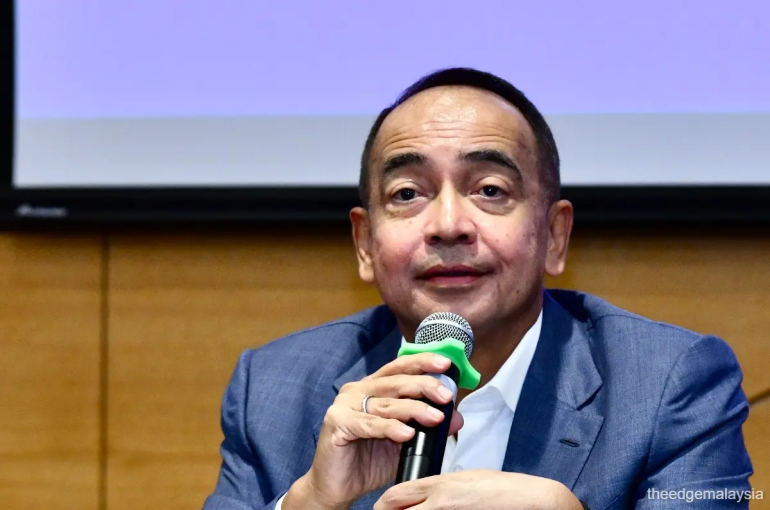Asean-BAC chairman Nazir Razak praises Malaysia’s calm, strategic response to US tariff threat

Asean-BAC Malaysia chairman Tan Sri Nazir Razak says Malaysia’s response demonstrated clarity and composure, in contrast with some countries that reacted ‘too quickly or too aggressively’. (Photo by Sam Fong/The Edge)
KUALA LUMPUR (May 6): Asean Business Advisory Council (Asean-BAC) Malaysia chairman Tan Sri Nazir Razak has commended the Malaysian government for its prudent and measured approach in dealing with the recent US tariff situation, calling it “astute” and a model for other countries in the region.
Malaysia’s response demonstrated clarity and composure, in contrast with some countries that reacted “too quickly or too aggressively”, Nazir said.
“I don’t compliment easily, but I really think our government has been very astute in its handling of the US tariff situation,” he said during a press conference by the Asean-BAC Malaysia on Tuesday.
He outlined four elements in Malaysia’s response — staying calm, engaging to understand the gap between rhetoric and reality, strategising and then negotiating.
“I think that’s absolutely the right way to handle the situation,” Nazir said. The measured strategy stands out against how other nations have responded, he added.
The tariffs, announced by US President Donald Trump on April 2, consist of a blanket 10% duty on all imports and an additional 24% tariff specifically targeting Malaysian products. The move has sparked concern among Malaysian policymakers and industry stakeholders, given the country’s export exposure to the US.
On April 9, the US administration postponed the country-specific tariffs for 90 days to allow further negotiations with over 75 affected countries. The general 10% tariff remains in effect indefinitely. In contrast, tariffs on Chinese goods have soared to a cumulative rate of 145%.
During a special parliamentary session on Monday, Prime Minister Datuk Seri Anwar Ibrahim announced that the government has pledged to provide up to RM1.5 billion in additional loan guarantees and financing for small and medium-sized enterprises (SMEs) affected by US tariff measures.
The government will raise the allocation under the Business Financing Guarantee Scheme to assist affected SMEs in securing commercial bank loans.
In the meantime, the government is actively engaging the US to negotiate a reduction in the proposed tariff rate, Anwar stressed.
Malaysia will also strengthen its integration within Asean and promote regional economic activity through initiatives such as the Asean Power Grid, a cross-border infrastructure project aimed at improving energy connectivity in the region, he added.
Asean must tackle rising non-tariff barriers — Nazir
At the press conference on Tuesday, Nazir also urged Asean member states to address the proliferation of non-tariff barriers (NTBs), which he said are undermining regional integration and frustrating businesses.
While tariffs across the region have been reduced over the years, NTBs have been on the rise, he noted, citing data that places the number of such barriers in Asean at over 9,600.
“There’s a strong correlation between the reduction in tariffs and the rise of non-tariff barriers,” he said, pointing out that many of these barriers remain opaque and lack clear justification.
He gave the example of halal food products from Malaysia facing additional processes to enter Indonesia, which he said exemplified unnecessary regulatory friction.
Nazir called on Asean to treat NTBs with greater urgency, particularly as the region positions itself for deeper economic integration and engages in negotiations with external partners.
Reviewing barriers highlighted by businesses during such engagements could create momentum for reform and increased transparency across member states, he added.
Earlier, Nazir shared that the Asean-BAC Malaysia’s 12 flagship initiatives have been progressing steadily through ongoing formal consultations with Asean bodies. These consultations occurred at the 31st Asean Economic Ministers’ Retreat in February and most recently at the 12th Asean Finance Ministers’ and Central Bank Governors’ Meeting last month.
He added that Asean-BAC will also be having a formal dialogue with Asean leaders at the upcoming 46th Asean Summit later this month.
Among the initiatives advocated by Asean-BAC is the flagship Asean Business Entity (ABE) framework, which calls for the creation of a new regional business category to allow companies greater operational flexibility across Asean markets.
Its Asean Common Carbon Market initiative aims to address the lack of a unified carbon market in Asean. Through streamlined methodologies across countries and increased market efficiency, this framework will support a well-functioning and liquid carbon credit market.
Meanwhile, its Asean IPO Prospectus initiative advocates the harmonisation of cross-border initial capital-raising to facilitate a wider pool of capital for regional enterprises. Additionally, Asean-BAC Malaysia has proposed to rebrand the SEA Games as Asean Games.
Source: theedgemalaysia.com


